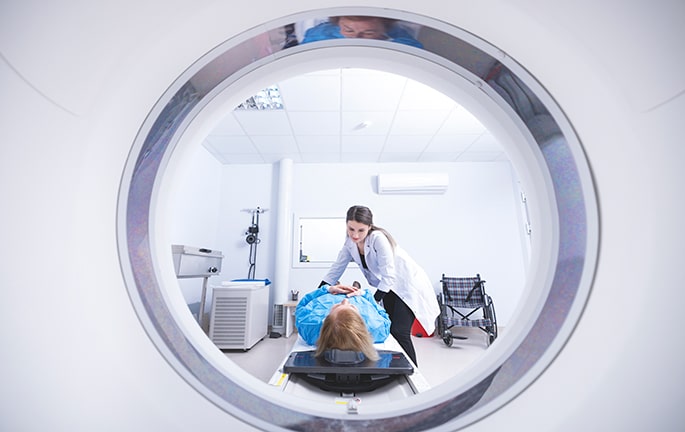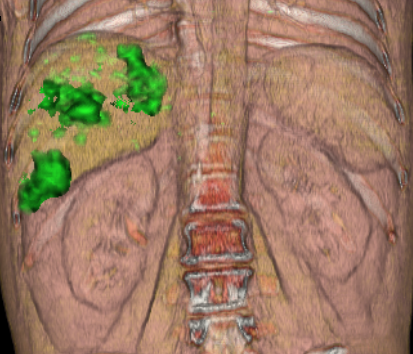Radiation Oncology
Get answers to your questions about radiation oncology and its main treatment types. Learn about the conditions most commonly treated by this specialty, the symptoms and side effects that may occur, and how radiation therapy works. Schedule a consultation at one of our hospitals.

What is radiation oncology?
Radiation oncology is a branch of medicine specializing in the use of ionizing radiation to treat cancer and certain non-neoplastic diseases, meaning those that involve benign tumors. In some cases, radiation therapy is combined with other treatments to achieve a more effective outcome.
What does radiation oncology study?
This specialty examines the effects of ionizing radiation on patients and analyzes the factors that influence why some tumors respond favorably to this type of treatment while others remain resistant. Just as there are different types of cancer, oncologists use various types of radiation therapy to treat them:
- External radiation therapy: A device generates high-energy X-rays, and a linear accelerator directs them toward the tumor.
- Intraoperative radiation therapy: High doses of radiation are applied directly to the tumor residue during surgery.
- Brachytherapy: Radiation is generated from a device placed very close to the tumor, minimizing its impact on healthy tissues.
Who is radiation oncology for?
Radiation oncology is primarily aimed at cancer patients. However, radiation therapy is also used to treat individuals with inflammatory or degenerative non-neoplastic diseases, such as osteoarthritis or tendinitis.
Techniques, procedures, and diagnostic methods
The technology behind radiation therapy has advanced significantly in recent years, allowing for a wide variety of approaches and techniques to target tumors as effectively as possible. Some of the most commonly used procedures include:
- Stereotactic radiosurgery (SRS): An alternative to surgical treatment for brain tumors, this method delivers precise radiation to preserve healthy tissue.
- Stereotactic body radiation therapy (SBRT): Administers ablative doses of radiation to the tumor with extreme precision. The total radiation dose is delivered over several days in smaller amounts to minimize impact on healthy areas.
- Intensity-modulated radiation therapy (IMRT): Tailors radiation to the shape of the tumor to avoid damaging healthy tissue.
- Volumetric modulated arc therapy (VMAT): Delivers radiation from a device that rotates 360 degrees around the patient to target the tumor from multiple angles. Like IMRT, it can be adjusted to fit the tumor’s shape and size.
Diseases and symptoms
Main conditions and diseases treated
Radiation oncology focuses on treating various types of cancer, including:
- Ewing’s sarcoma
- Hodgkin’s lymphoma
- Melanoma or skin cancer
- Leukemia
- Breast cancer
- Colon cancer
- Lung cancer
- Basal cell carcinoma
- Cushing’s syndrome
- Throat cancer
- Multiple myeloma
- Brain tumors
Related symptoms
Radiation oncology treats different types of cancer that present a wide range of symptoms. The treatments used are highly effective but can cause recognizable side effects, such as:
- Headaches
- Nausea and vomiting
- Extreme fatigue
- Tiredness
- Seizures
- Hair loss
- Hearing loss
- Skin changes
- Difficulty speaking
- Memory problems
- Swelling
- Blurred vision
About the radiation oncology consultation
We solve any doubts you may have before you see the specialist
Patients referred to a radiation therapy consultation have been sent by their oncologist to receive the most appropriate treatment for their tumor. Therefore, the specialist usually has extensive information about the disease and will use the appointment to assess the approach to be taken and clarify any doubts.
What should you keep in mind?
Radiation therapy is a highly effective cancer treatment, but in most cases, results are seen in the long term, requiring patience. After evaluation by the team of oncology and radiotherapy specialists, treatment sessions will be administered for either curative purposes, to reduce the tumor, or palliative purposes, to relieve cancer symptoms and improve the patient’s quality of life.
What should I bring to the consultation?
Preparation for radiation therapy sessions is crucial. It is recommended to maintain hygiene using water and soap, but avoid perfumes, deodorants, and razors. As for clothing, it is advisable to wear comfortable, loose-fitting, cotton garments.

If you have any further questions, please contact us through the Patient Services telephone number: 900 301 013































